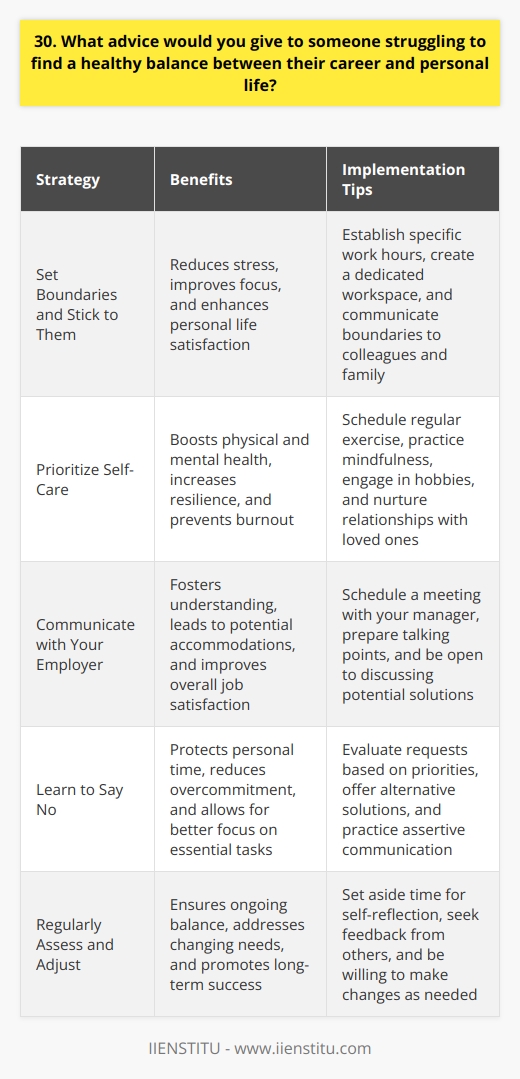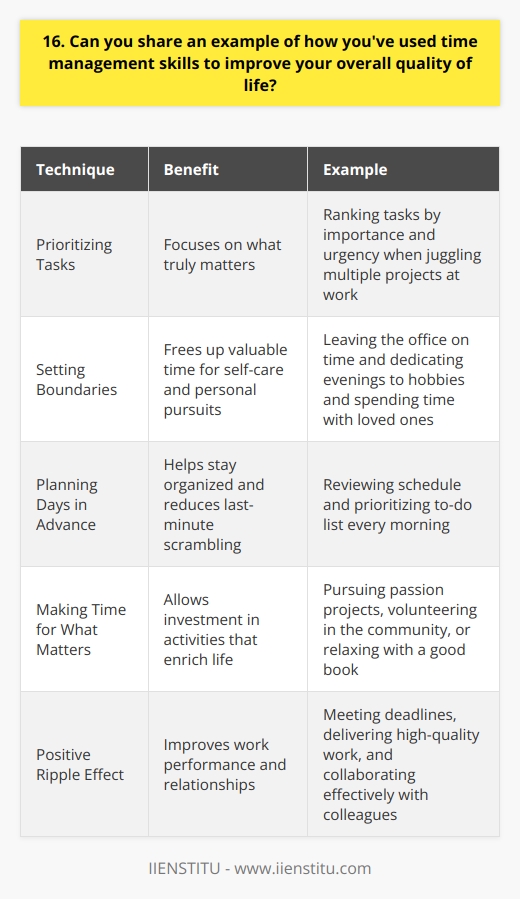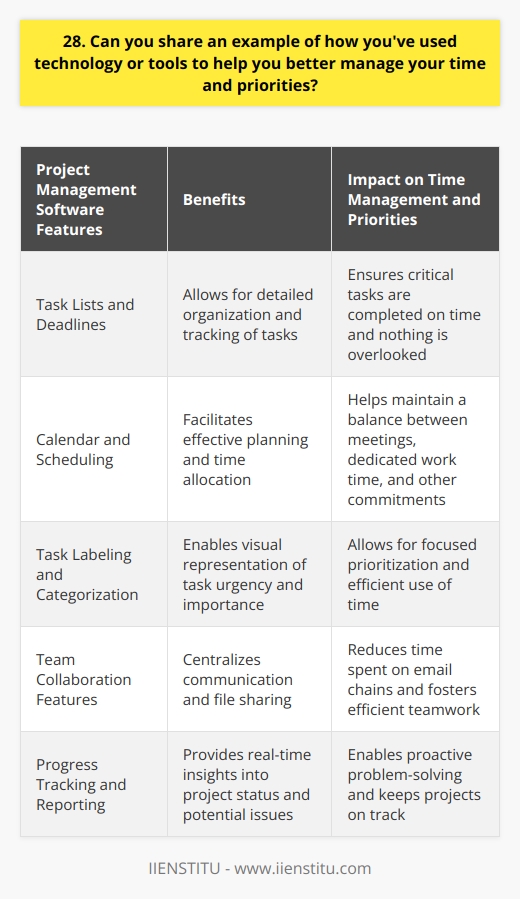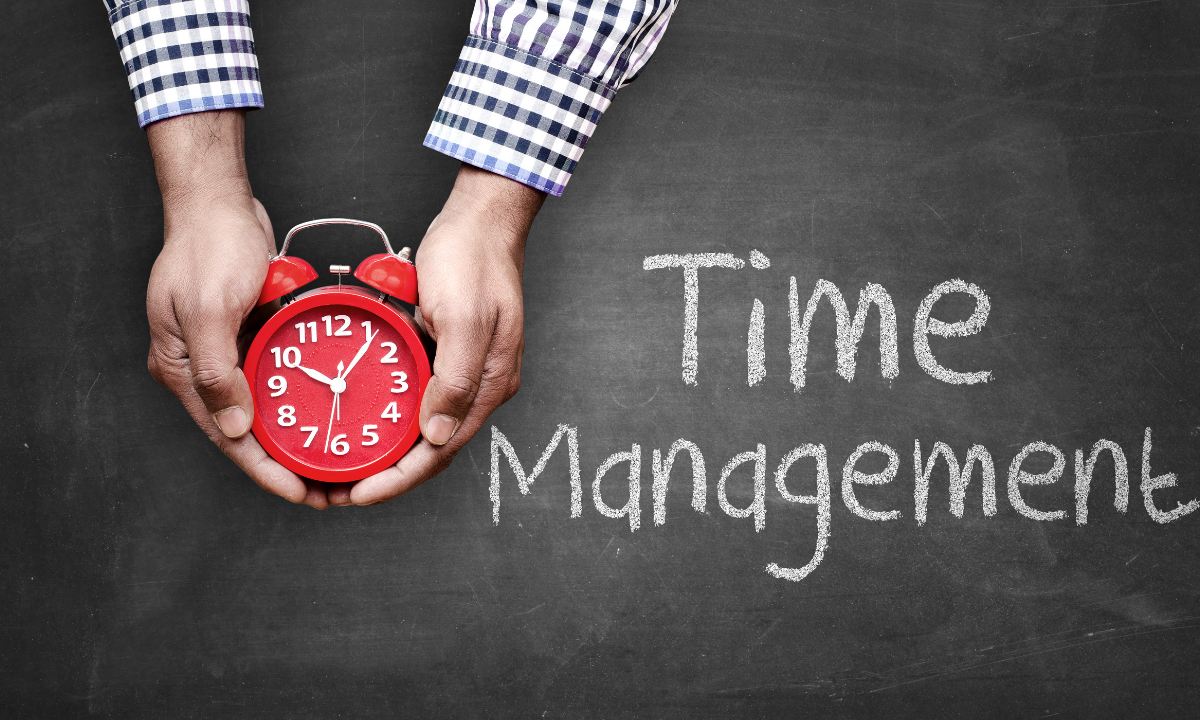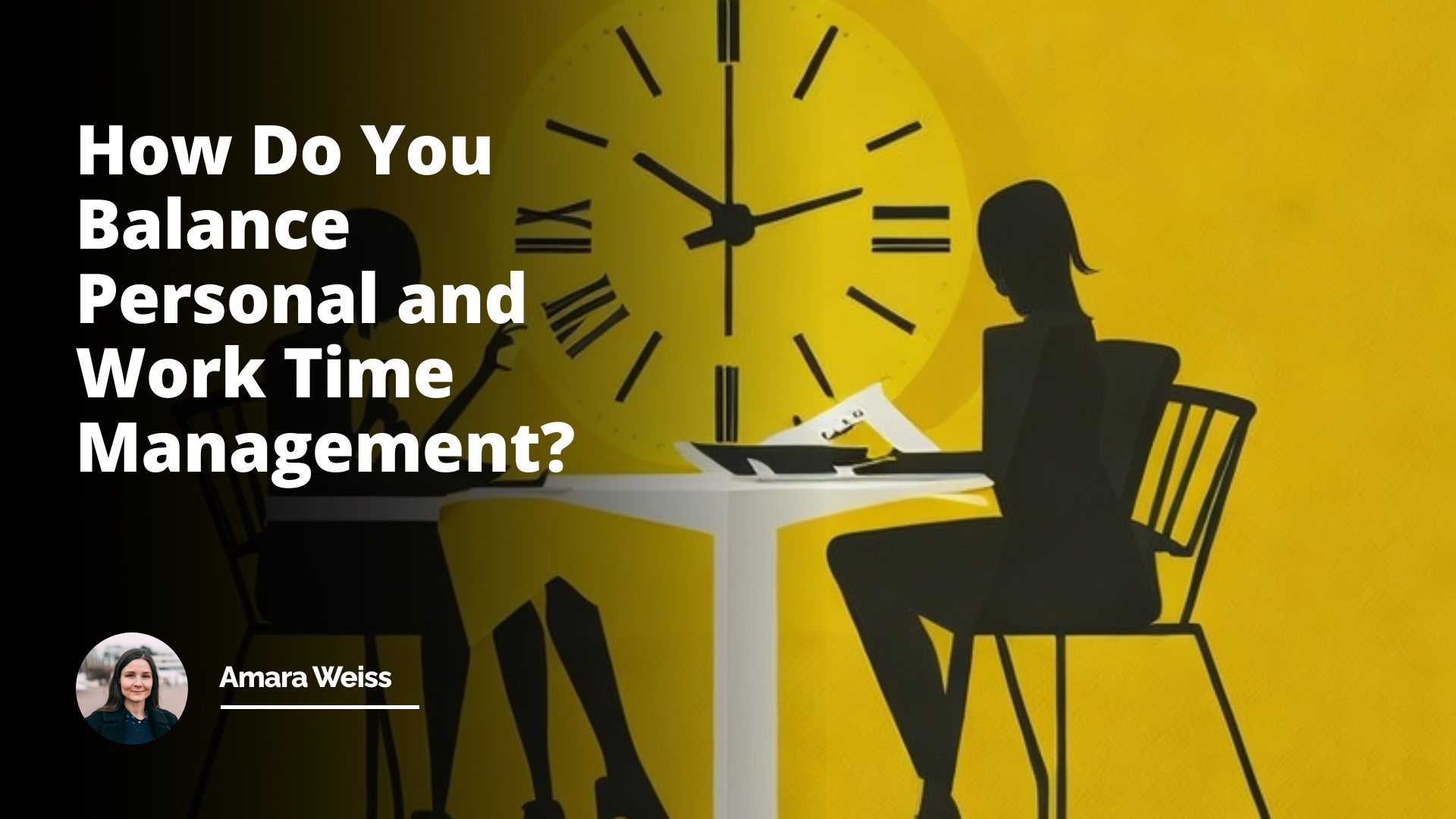
Understanding the Importance of Work-Life Balance in Job Interviews
You may well remember the first time you walked into a job interview, heart pounding but wearing your best “I-can-do-this” smile. One question that often pops up, pressing us to think deeper, is: "How do you balance your personal and work time management?" This question isn't just a prompt; it sheds light on how pivotal this balance has become in the modern work environment. As the lines between work and personal life blur, employers are ever keen on understanding just how well you manage this often complex dance.
Why Employers Ask About Work-Life Balance
I vividly recall an interview from my early career days, working with a bustling marketing firm. My interviewer, an experienced old hand in the industry, leaned forward and asked with genuine curiosity, “So, how do you manage your work and personal life?” To him, this question was a gauge of more than just my day-to-day logistics; it was a measure of sustainability.
Employers today appreciate that employees are not mere cogs in a machine but integral assets—individuals who bring not only skills but creativity and resilience to the table. They seek assurance that you, as their potential investment, can handle the ebb and flow of professional duties without compromising personal well-being. Here’s what they're really digging into with this question:
How To Prioritize Digital Marketing Tasks İnterview Question
Interview Question How Often Do You Use Problem Solving İn Job İnterviews
Time Management:
They want to see how you handle the balancing act of ambitions and responsibilities without dropping the ball. Managing time well across different roles—work and personal—is often synonymous with efficiency and productivity.
Interview Question: How Have Your Time Management Strategies Evolved Over the Years?
Interview Question: How Do Time Management Breaks Benefit You?
Stress Management:
On a more human note, your ability to navigate between the personal and professional arenas speaks volumes about your stress-handling capabilities. Can you unwind after a hard day's work? Do you know when to step back to avoid burning out?
Priority Setting:
Can you differentiate between urgent and important tasks? An ability to clearly outline what needs to be done versus what can be postponed is a hallmark of good organizational skills.
The Role of Work-Life Balance in Career Progression
I remember discussing the topic with a mentor over coffee, a decade into my career. She noted how the cascading effects of mismanaged work-life balance could potentially hinder career progression. It's not just about feeling overwhelmed; it's about the risk of burning out and, consequently, not giving your fullest potential to projects at hand.
Balanced time management reflects well on your resume. It indicates to employers that you’re unlikely to become another statistic of overwork—a phrase growing all too familiar in numerous industries today.
Pro Tip: While discussing this question in an interview, mention any strategies or tools that genuinely assist in organizing your time. Whether it be Google Calendar, Trello boards, or even a good old-fashioned planner, illustrating your practical approach tells your interviewer that you have a plan in action.
Answering the “Balance” Interview Question
So, let’s get down to brass tacks. How do you balance work and personal life interview questions without sounding rehearsed or cliched? It's about presenting your real self with honesty and a touch of creativity.
Demonstrate Your Tools:
Discuss digital or analog tools that help you manage your time efficiently, balancing work commitments and personal time.
Share Personal Stories:
Perhaps there was a time when your ability to juggle both worlds led to a great success or saved the day. Sharing such stories can really illustrate your adeptness in action.
Highlight Personal Rules:
Whether it’s setting clear work hours, enforcing a no-phone during dinner policy, or ensuring one’s weekend is stress-free, these personal commitments often translate into efficient personal and professional balance.
Strategies for Balancing Work and Life
Over time, I've experimented with multiple ways to achieve this elusive balance. Here are some strategies that have proven successful, not just for me, but for many peers as well:
Time Blocking:
Setting specific time slots in your calendar for different activities can prevent professional obligations from encroaching into personal time. Bold those non-negotiables, like family dinners or morning jogs.
What strategies do you employ to maintain a balance between personal and work time?
Could you elaborate on your methods for managing personal time and work hours?
What are your tips for achieving a work-life balance?
Can you share your approach to balancing obligations at work with personal time?
How do you ensure you have enough time for both work and personal activities?
How do you schedule your time to accommodate both work and personal pursuits?
In what ways do you prioritize your work and personal time management?
Can you provide an example of how you strike a balance between work time and personal time?
What kind of routine do you follow to ensure a healthy balance between work and personal life?
How does your day-to-day plan facilitate an equilibrium between your personal time and work time?
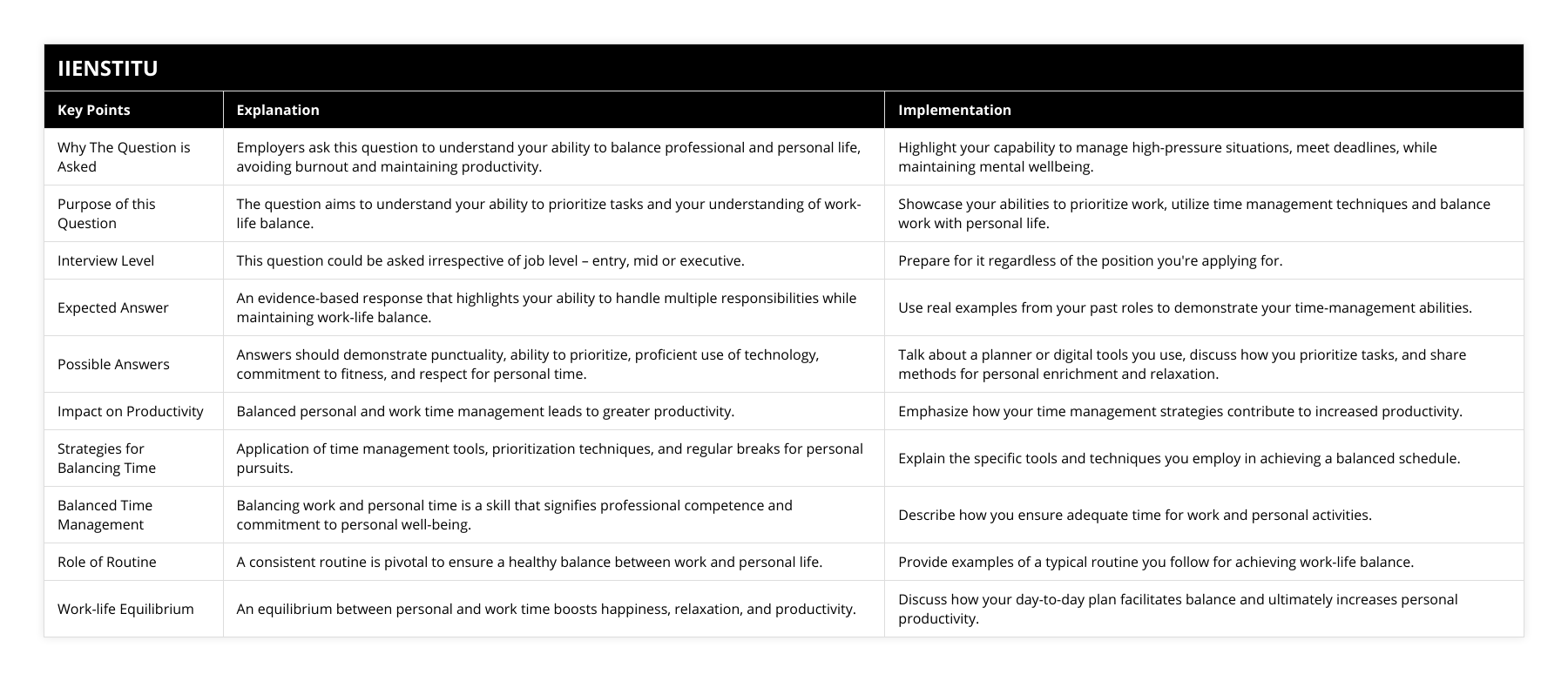
1 - Prioritizing Self-Care:
Remember, without self-care, productivity wanes. And believe me, during a particularly challenging project phase, sticking to a Sunday hike routine was a lifesaver.
2 - Effective Delegation:
Trusting your team—or even your partner—by delegating tasks, ensures you aren't overburdened. Lightening your load allows focus on what really matters, both at work and home.
3 - Limiting Distractions:
While working, especially from home, it’s easy to succumb to distractions. Setting up a separate workspace and using focus-enhancing apps can aid productivity significantly.
4 - Reflection and Adjustment:
Regularly reflecting on what works and what doesn’t helps in adjusting your strategy for time management. Life shifts, and so should your strategy for maintaining balance.
The Psychological Benefit of Work-Life Balance
The impact of balanced personal and work time management isn't confined to professional success; it plays a crucial role in mental health and emotional well-being. A well-struck balance often results in:
Increased Job Satisfaction: When work doesn't seep into your downtime, it’s easier to appreciate both realms.
Enhanced Focus and Productivity: Confined work time often leads to sharper focus, as you strive to complete tasks efficiently, knowing your personal time is just around the corner.
Stronger Relationships: By ensuring work doesn't overshadow personal life, you invest time in relationships, building a supportive network outside your workplace.
The Secret Sauce: Empathy in Interview Answers
Responding to the question, "How do you balance personal and work time?" with empathy allows the interviewer to see you as a relatable and understanding candidate. Maybe share about a time when priorities clashed, and you had to make choices based on empathetic reasoning, showing consideration for personal responsibilities while tackling work demands.
When I was working on a major project, my daughter fell sick. It was tough, but I communicated with my team about my situation. I managed to work from home initially, took a few extra hours when my partner could step in, and kept the momentum going without sacrificing deliverables or my fatherly responsibilities.
Comparing Time Management Tools
I must admit, the tech-savvy side of me loves the challenge of integrating technology to optimize time management. Let's explore some personal and professional tools I and many others find helpful:
Digital Calendars (Google, Outlook):
Pros: Sync across devices, easy sharing.
Cons: Highly reliant on internet connectivity.
Task Management Apps (Trello, Asana):
Pros: Visualization aids in keeping track of multiple tasks, great for team settings.
Cons: Can be overwhelming if not maintained regularly.
Traditional Planners:
Pros: Allows for personal creativity, minimizes screen time.
Cons: Doesn’t sync with digital reminders, risk of being outdated.
Looking Ahead: Final Thoughts
Achieving a harmonious balance between professional obligations and personal life isn't merely a passing trend or something employers bring up to fill the time at interviews. It is a fundamental component of a well-rounded life and career success. Today, many employers actively support this balance, offering flexible work hours and promoting wellness programs.
Picture this balance as a tightrope walk. Too much lean in either direction could lead to a fall, but a steady step forward, with careful adjustments, sees you reaching end goals with grace. It’s this vision of balance that we must carry polished, articulate, and ready to share during interviews, opening doors to fulfilling careers.
References:
Aaron Levy, Ph.D., "The Mindful Life: Time Management Strategies for a Balanced Life," Greenwood Press, 2015.
Sandra Jones, "Balancing Act: The Science of Work-Life Harmony," Fairchild Books, 2018.
Robert Smith, "Productivity Hacks: Changing the Rules of Work," McGraw-Hill Education, 2019.
Frequently Asked Questions
1. How do you prioritize tasks and manage your workload effectively?
When it comes to prioritizing tasks and managing my workload effectively, I rely on a few key strategies. First, I always start by assessing the urgency and importance of each task on my plate. This helps me determine which items need to be tackled immediately and which can wait.
Communication is Key
I've found that maintaining open lines of communication with my teammates and supervisors is crucial. By staying in touch, I can ensure that everyone is on the same page regarding priorities and deadlines. Plus, it allows me to ask for help or guidance when needed.
Breaking It Down
When faced with a large, complex project, I like to break it down into smaller, more manageable chunks. This not only makes the task feel less overwhelming but also helps me stay focused and motivated. I set mini-goals for myself and celebrate each milestone along the way.
Flexibility Is a Must
In my experience, things rarely go according to plan. That's why I've learned to be adaptable and flexible in my approach. If priorities shift or unexpected challenges arise, I'm ready to pivot and adjust my strategy as needed. Being able to think on my feet has served me well in fast-paced work environments.
The Power of Lists
Finally, I'm a big believer in the power of lists. Every day, I create a to-do list that outlines my priorities and helps me stay organized. As I complete each task, I get a sense of accomplishment that keeps me going. Plus, it's a great way to track my progress and ensure that nothing falls through the cracks.
At the end of the day, prioritizing tasks and managing my workload effectively comes down to a combination of planning, communication, and flexibility. It's a skill I've honed over time, and one that I believe has been instrumental in my success.
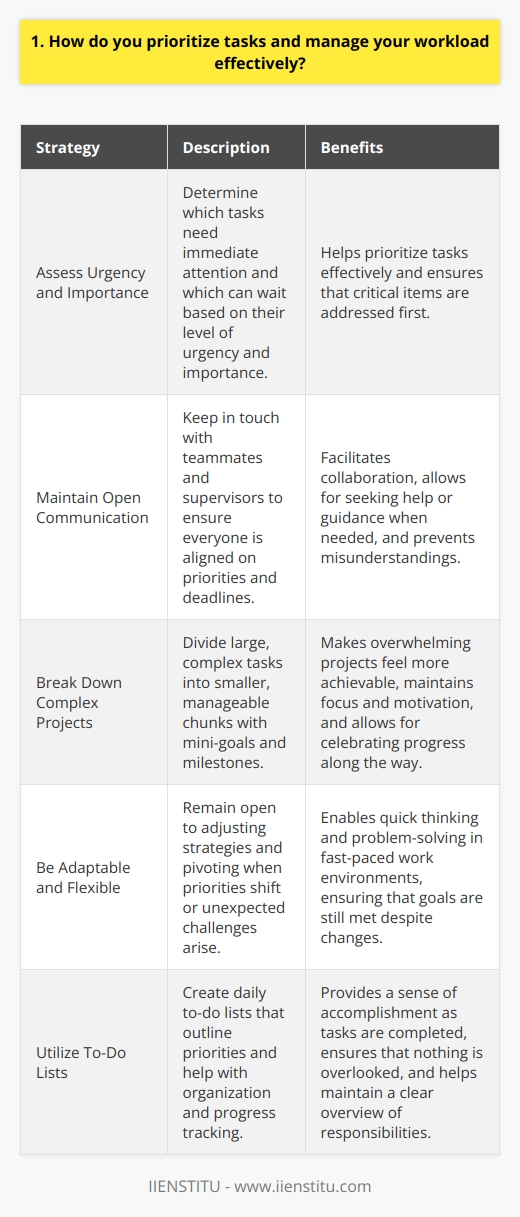
2. What strategies do you use to maintain a healthy work-life balance?
Maintaining a healthy work-life balance is crucial for both personal well-being and professional success. Over the years, I've developed several strategies that help me strike this delicate balance.
Setting Clear Boundaries
I believe in establishing clear boundaries between work and personal life. When I'm at work, I focus solely on my professional responsibilities, and when I'm off the clock, I disconnect from work-related matters. This allows me to be fully present in each aspect of my life.
Prioritizing Self-Care
Self-care is a top priority for me. I make sure to allocate time for activities that promote my physical, mental, and emotional well-being. Whether it's hitting the gym, practicing meditation, or pursuing a hobby, I carve out dedicated time for myself.
Effective Time Management
I'm a firm believer in effective time management. I use tools like calendars and to-do lists to plan my days and weeks. By prioritizing tasks and setting realistic deadlines, I ensure that I can meet my work obligations while still having time for personal commitments.
Communicating Openly
Open communication is key to maintaining a healthy work-life balance. I make sure to communicate my needs and expectations clearly with my colleagues and superiors. If I'm feeling overwhelmed or need support, I don't hesitate to reach out and have honest conversations.
Remember, finding the right work-life balance is an ongoing process. It requires self-awareness, flexibility, and the willingness to make adjustments when needed. By implementing these strategies consistently, I've been able to maintain a fulfilling personal life while excelling in my professional endeavors.
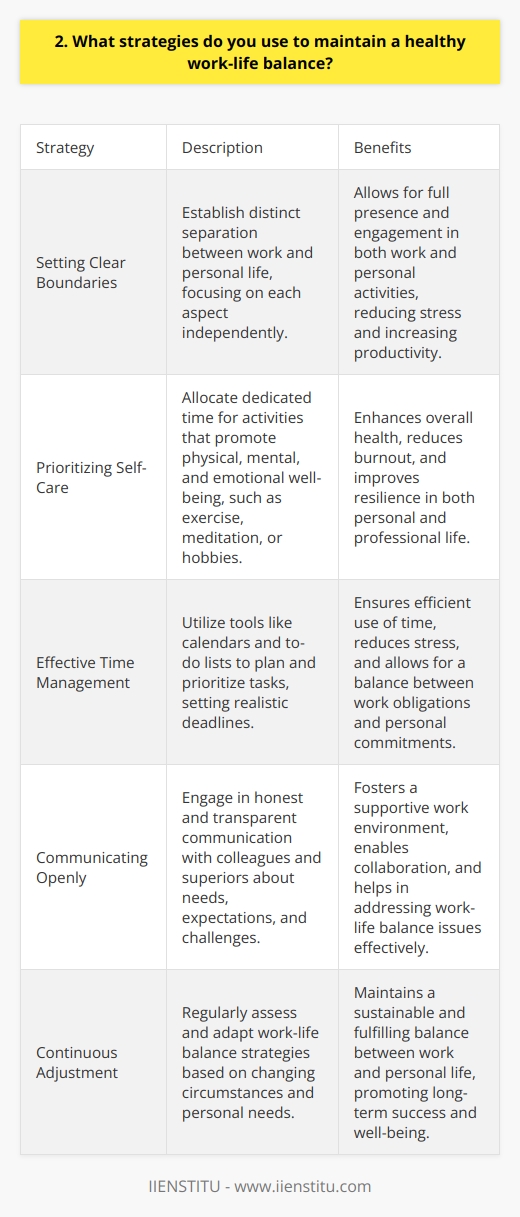
3. How do you handle situations where your personal life interferes with your work responsibilities?
When faced with situations where my personal life interferes with work responsibilities, I prioritize open communication and proactive problem-solving. I believe in being transparent with my manager about any challenges I'm facing, while also taking ownership of finding solutions.
Communicating Openly
I've learned that it's essential to have an honest dialogue with my supervisor when personal issues arise. By keeping them informed, we can work together to develop a plan that allows me to manage both my personal and professional commitments effectively.
Example from My Experience
A few years ago, my father underwent surgery, and I needed to be there to support my family. I approached my manager, explained the situation, and proposed a temporary flexible work arrangement. By being upfront and solution-oriented, we were able to find a mutually beneficial approach that allowed me to be present for my family while still meeting my work obligations.
Proactive Problem-Solving
In addition to communication, I believe in taking a proactive approach to mitigate potential disruptions. This involves anticipating challenges and developing contingency plans to ensure that my work responsibilities are still met, even in the face of personal obstacles.
Strategies I Employ
Ultimately, I recognize that life can be unpredictable, but I am committed to finding ways to balance my personal and professional responsibilities with integrity and dedication.
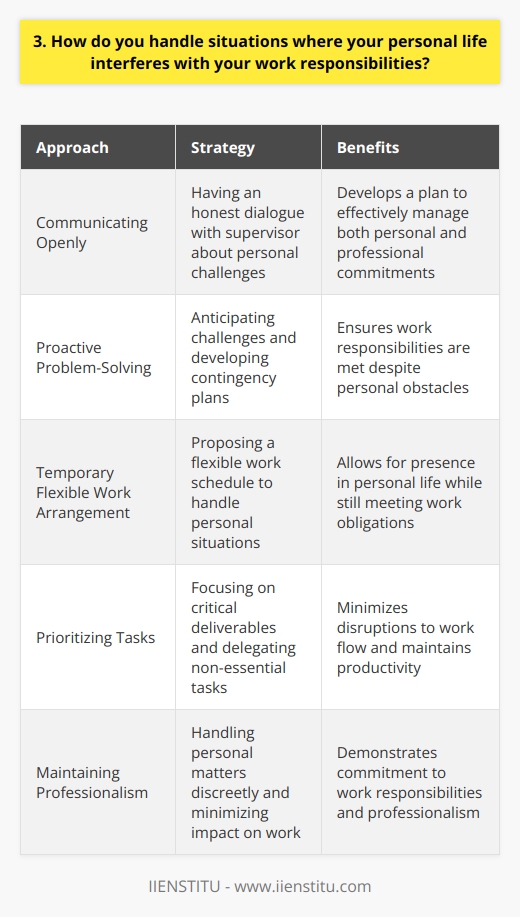
4. Can you describe a time when you had to work overtime to meet a deadline while also managing personal commitments?
In my previous role as a marketing coordinator, I faced a situation where I had to work overtime to meet a tight deadline while also managing personal commitments. It was a challenging time, but I knew that the project was critical for our client and our company's success.
Prioritizing Tasks and Communicating with the Team
To tackle this situation, I first prioritized my tasks and communicated with my team about the urgent deadline. We collaborated closely, dividing the work and setting clear goals for each team member. This helped us stay organized and focused on the most important aspects of the project.
Managing Personal Commitments
At the same time, I had to manage my personal commitments, including a family event that I had planned to attend. I communicated openly with my family about the situation and asked for their understanding and support. I also made sure to take short breaks throughout the day to avoid burnout and maintain a positive attitude.
Delivering Quality Work on Time
Despite the pressure, I remained committed to delivering high-quality work. I double-checked my tasks, ensured that all the details were accurate, and communicated regularly with my team and the client. In the end, we successfully met the deadline, and the client was thrilled with the results.
Lessons Learned
This experience taught me the importance of effective communication, prioritization, and teamwork in handling challenging situations. It also reinforced my ability to manage stress and maintain a strong work ethic, even when faced with competing priorities. I believe that these skills have prepared me well for the demands of this role, and I am confident that I can handle similar situations in the future.
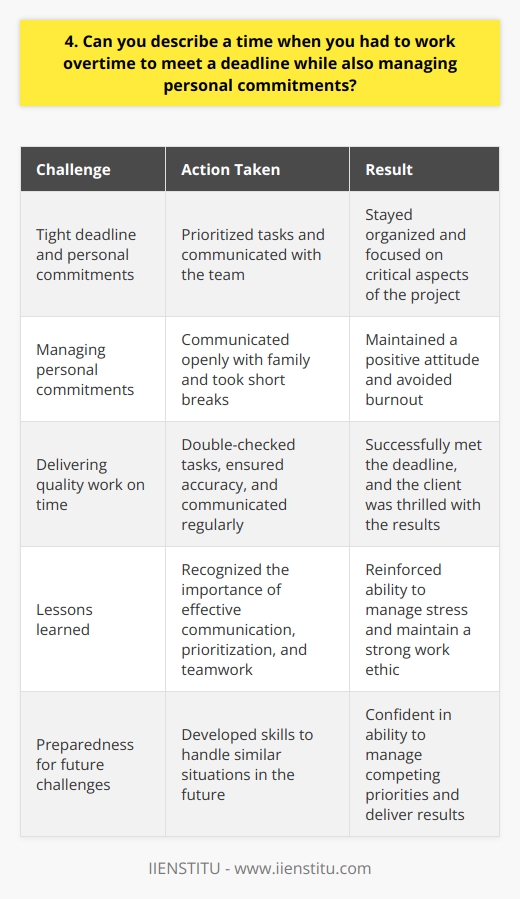
5. How do you ensure that you have enough time for self-care and relaxation outside of work?
Ensuring that I have enough time for self-care and relaxation outside of work is a top priority for me. I believe that maintaining a healthy work-life balance is essential for both personal well-being and professional success. Here are a few strategies I use to make sure I have adequate time for myself:
Setting Boundaries
I set clear boundaries between my work and personal life. When I'm off the clock, I make a conscious effort to disconnect from work-related tasks and focus on my own needs and interests. This might mean turning off email notifications on my phone or saying no to extra projects that would cut into my personal time.
Prioritizing Self-Care Activities
I schedule self-care activities into my calendar just like I would any other important commitment. Whether it's a yoga class, a hike in nature, or simply some quiet time to read a book, I treat these activities as non-negotiable parts of my routine. Making self-care a regular habit helps me recharge and show up as my best self both at work and in my personal life.
Communicating with Colleagues and Managers
I'm not afraid to communicate my needs and boundaries to my colleagues and managers. If I'm feeling overwhelmed or stretched too thin, I'll have an honest conversation about my workload and brainstorm solutions to help me maintain a healthy balance. Most managers appreciate when employees are proactive about managing their well-being, as it leads to better performance and job satisfaction in the long run.
At the end of the day, I know that taking care of myself is key to being a productive and engaged employee. By setting boundaries, prioritizing self-care, and communicating my needs, I'm able to show up as my best self both at work and in my personal life.
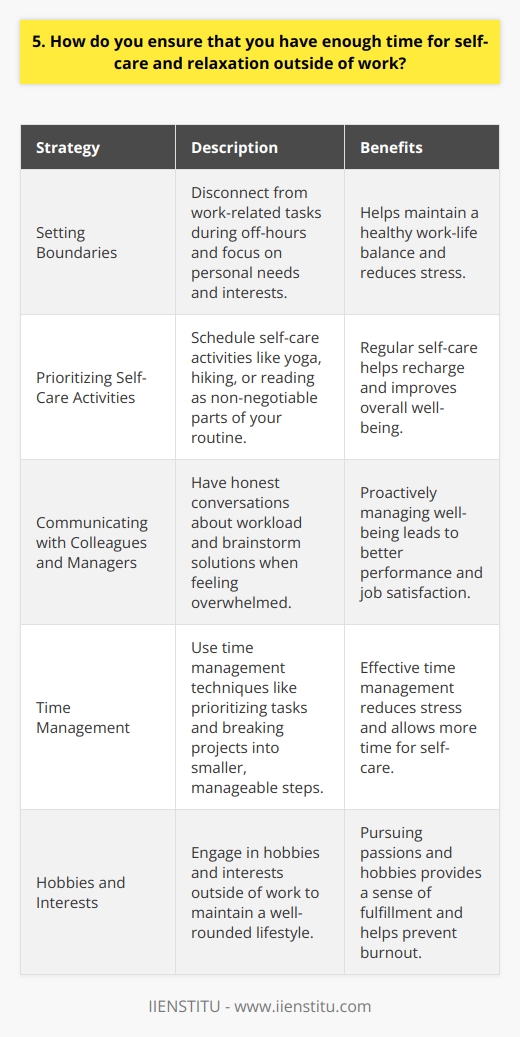
6. What techniques do you use to stay focused and productive during work hours?
To stay focused and productive during work hours, I employ several techniques that have proven effective for me:
Prioritizing Tasks
I start each day by identifying the most critical tasks and tackling them first. This helps me make significant progress early on and boosts my motivation for the rest of the day.
Time Blocking
I allocate specific time blocks for different tasks, ensuring that I dedicate focused attention to each one. This method prevents me from getting overwhelmed and allows me to work efficiently.
Minimizing Distractions
To maintain focus, I eliminate potential distractions. I silence my phone notifications, close unnecessary browser tabs, and use noise-canceling headphones when needed. Creating a clutter-free workspace also helps me concentrate better.
Taking Regular Breaks
I've learned that taking short breaks every hour or so actually enhances my productivity. During these breaks, I step away from my desk, stretch, or engage in brief relaxation exercises. This helps me recharge and return to work with renewed energy.
Collaborating and Communicating
I believe in the power of collaboration. When faced with challenging tasks, I reach out to my colleagues for their insights and expertise. Open communication keeps me engaged and motivated throughout the day.
By implementing these techniques consistently, I've been able to maintain high levels of focus and productivity in my work. I'm always eager to learn and adapt new strategies to further enhance my performance.
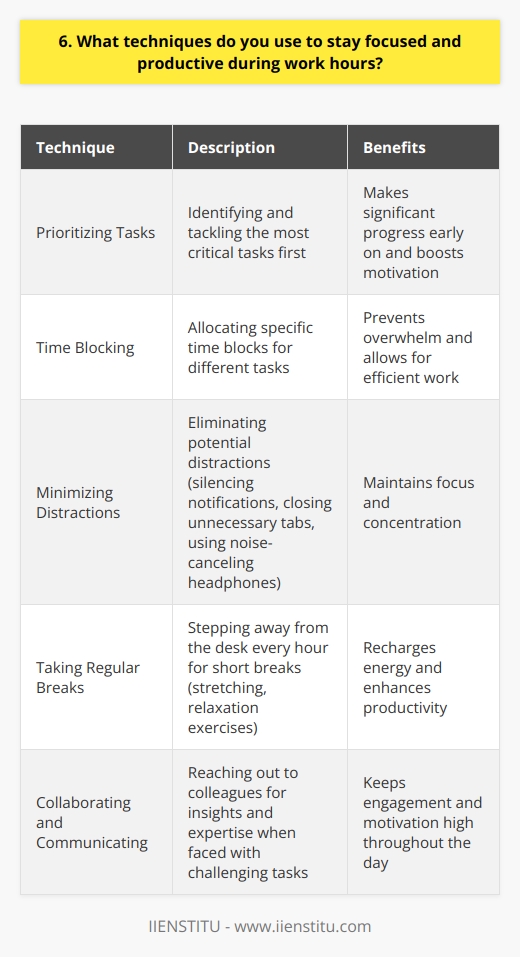
7. How do you communicate with your team or manager when personal issues arise that may impact your work?
I believe open and honest communication is essential when personal issues arise that may impact work performance. My approach is to inform my manager as soon as possible, explaining the situation clearly and concisely. I also provide an estimate of how long the issue may affect my work.
Proactive Problem-Solving
When facing personal challenges, I try to be proactive in finding solutions. I reflect on potential ways to minimize the impact on my job duties. If feasible, I propose a flexible work arrangement or suggest tasks I can still complete effectively. This demonstrates my commitment to the team's success, even during difficult times.
Maintaining Professionalism
While I aim to be transparent about personal matters affecting my work, I'm mindful not to overshare. I keep the conversation professional, focusing on the relevant facts and implications for my role. My goal is to reassure my manager that I'm handling the situation responsibly.
Follow-Up and Updates
After the initial discussion, I provide periodic updates to my manager on the status of the personal issue. I inform them of any changes or progress made. Once the matter is resolved, I express gratitude for their understanding. Moving forward, I recommit myself fully to my work responsibilities.
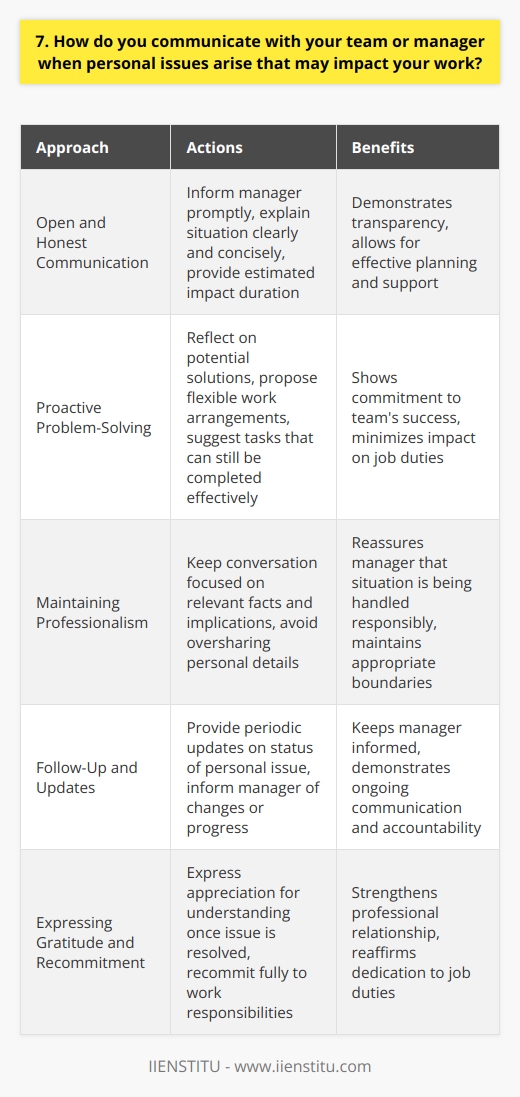
8. Can you give an example of how you've successfully juggled multiple projects with competing deadlines?
In my previous role as a marketing coordinator, I successfully managed multiple projects with tight deadlines. I prioritized tasks based on urgency and importance, creating a detailed schedule to stay organized.
Effective Communication
I maintained open lines of communication with my team and clients. Regular updates ensured everyone was on the same page and aware of any changes or challenges.
Flexibility and Adaptability
When unexpected issues arose, I remained flexible and adapted my approach as needed. I wasn't afraid to think outside the box and find creative solutions to keep projects moving forward.
Time Management Techniques
To maximize efficiency, I utilized time management techniques like the Pomodoro method. Breaking tasks into smaller, focused intervals helped me stay productive and avoid burnout.
Successful Outcomes
Through careful planning, collaboration, and a willingness to adapt, I consistently delivered high-quality projects on time. My efforts contributed to increased client satisfaction and positive feedback from my manager.
Juggling multiple projects can be challenging, but with the right strategies and mindset, it's definitely achievable. I actually enjoy the excitement of managing different tasks and seeing them all come together successfully in the end.
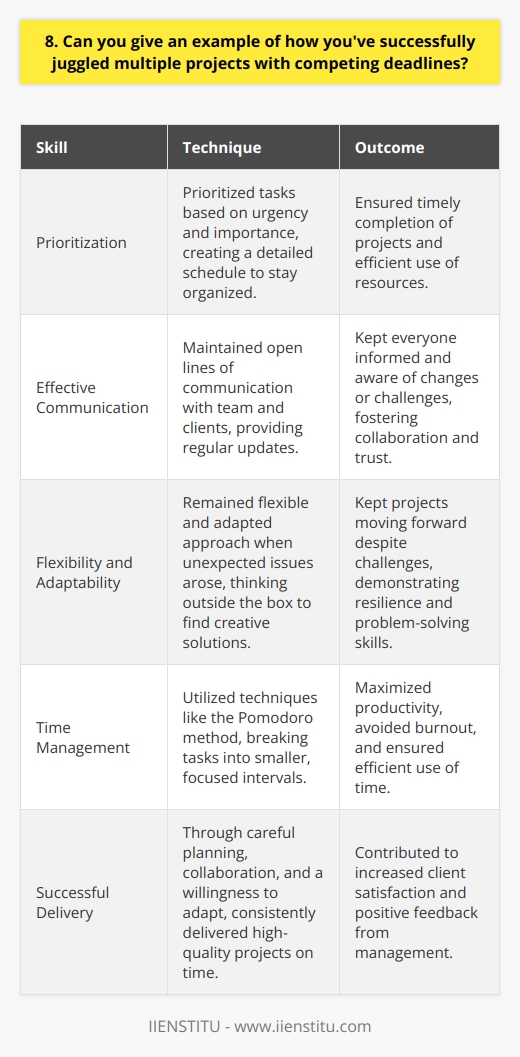
9. How do you handle the pressure of balancing work and personal life when things get hectic?
Balancing work and personal life can be challenging, especially during hectic periods. I've found that effective time management is key to maintaining a healthy balance.
Prioritize Tasks
I prioritize my tasks based on urgency and importance. This helps me focus on what truly matters and avoid getting overwhelmed by less critical responsibilities.
Communicate with Colleagues and Family
Open communication is crucial. I keep my colleagues informed about my workload and deadlines, ensuring everyone is on the same page. At home, I discuss my schedule with my family so they understand when I might need extra support or flexibility.
Set Boundaries
Setting clear boundaries between work and personal life is essential. When I'm with my family, I try to be fully present and avoid constantly checking work emails or taking non-urgent calls. On the flip side, I minimize personal distractions during work hours to maintain productivity.
Practice Self-Care
Taking care of myself is non-negotiable. Even during busy times, I make sure to eat well, exercise regularly, and get enough sleep. These habits help me stay energized and focused, both at work and at home.
Ultimately, balancing work and personal life is an ongoing process that requires flexibility, communication, and self-awareness. By staying organized, setting priorities, and taking care of myself, I'm able to navigate even the most hectic periods while still making time for the people and activities that matter most to me.
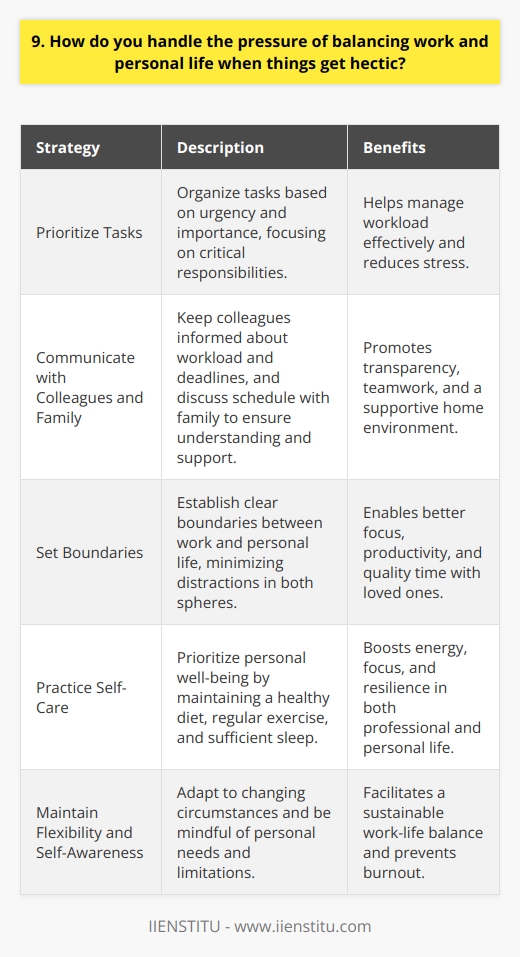
10. What role does time management play in maintaining a healthy work-life balance?
Time management is crucial for maintaining a healthy work-life balance. When I prioritize tasks and allocate time effectively, I can dedicate sufficient hours to both my professional responsibilities and personal life.
Setting Clear Boundaries
I set clear boundaries between work and personal time. When I'm at the office, I focus fully on my job duties, and when I'm at home, I disconnect from work-related matters to give my undivided attention to family, friends, and hobbies.
Using Time Management Techniques
I employ various time management techniques like the Pomodoro method and time blocking. These strategies help me stay organized, avoid procrastination, and ensure that I'm making steady progress on my goals both at work and in my personal life.
Communicating with Colleagues and Loved Ones
Open communication is key. I discuss my schedule and commitments with my team at work and my loved ones at home. This way, everyone is on the same page about when I'm available and when I need uninterrupted time for deep work or relaxation.
Regularly Reviewing and Adjusting
I regularly review my time management practices and make adjustments as needed. If I notice that I'm consistently working long hours or neglecting personal relationships, I take a step back and reassess my priorities. Maintaining a healthy work-life balance is an ongoing process that requires self-awareness and adaptability.
In my experience, effective time management has been instrumental in reducing stress, boosting productivity, and allowing me to fully engage in both my career and personal life. It's a skill that I continuously work on refining, and I believe it's essential for long-term success and well-being.
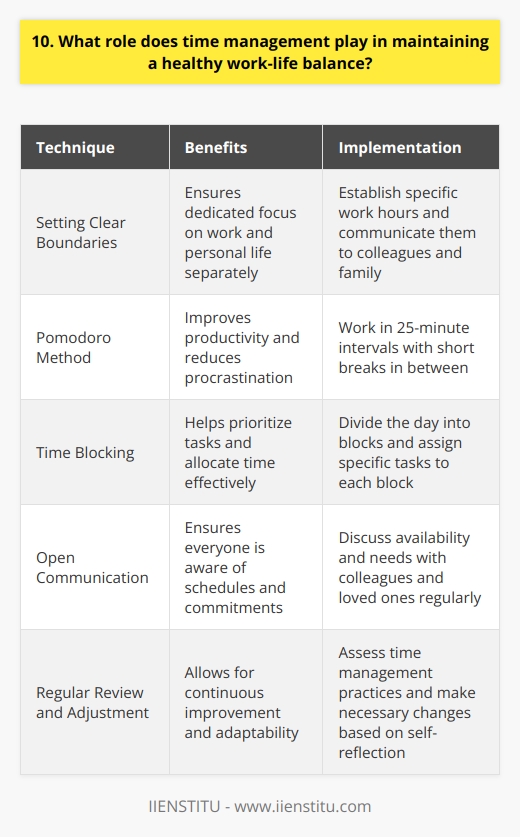
11. How do you avoid burnout while still meeting your professional obligations?
Burnout is a real concern in today's fast-paced work environment. I've found that the key to avoiding it while still meeting my professional obligations is to prioritize self-care and set clear boundaries.
Prioritize Self-Care
I make sure to take breaks throughout the day, even if it's just a few minutes to stretch or grab a snack. I also try to get enough sleep each night and eat healthy meals to keep my energy levels up.
Exercise is another important part of my self-care routine. I find that even a short walk or yoga session can help clear my head and reduce stress.
Set Clear Boundaries
It's important to communicate with my team and manager about my workload and capacity. If I feel like I'm taking on too much, I speak up and ask for help or clarify priorities.
I also try to disconnect from work outside of office hours as much as possible. That means not checking email constantly and taking time for hobbies and relaxation on weekends.
Stay Organized
Keeping my tasks and deadlines organized helps me avoid feeling overwhelmed. I use project management tools and to-do lists to stay on top of my responsibilities.
Breaking large projects into smaller, manageable chunks also makes them feel less daunting. I focus on one task at a time rather than multitasking, which can actually decrease productivity.
Seek Support
Finally, I'm not afraid to reach out for support when I need it, whether that's from coworkers, friends, or a mental health professional. Talking through challenges and getting an outside perspective can be really helpful in managing stress and preventing burnout.
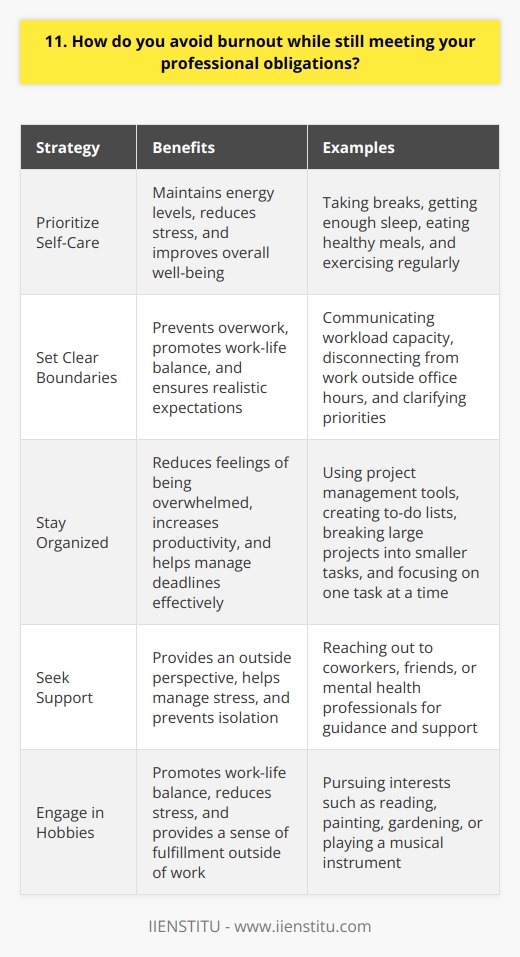
12. Can you discuss a time when you had to make a difficult decision between a personal commitment and a work responsibility?
In my previous role as a project manager, I faced a challenging situation where I had to make a difficult decision between a personal commitment and a work responsibility. My best friend's wedding was scheduled on the same day as an important client meeting that I was responsible for leading.
Weighing the Options
I carefully considered the potential consequences of each choice. Missing the client meeting could have jeopardized the project and damaged my professional reputation. However, my best friend's wedding was a once-in-a-lifetime event that I didn't want to miss.
Seeking a Compromise
I decided to approach my manager and explain the situation honestly. I proposed a solution where I would attend the wedding ceremony and reception, but work extra hours leading up to the meeting to ensure all preparations were in place.
Communicating with the Team
I also communicated my plan to the project team and delegated certain responsibilities to ensure a smooth meeting in my absence. I made myself available via phone in case any urgent issues arose during the meeting.
The Outcome
In the end, the client meeting went well, and I was able to attend my best friend's wedding without compromising my work responsibilities. This experience taught me the importance of open communication, proactive planning, and finding creative solutions to balance personal and professional commitments.
I believe that by being transparent, reliable, and solution-oriented, it is possible to navigate difficult decisions and maintain both personal and professional integrity.
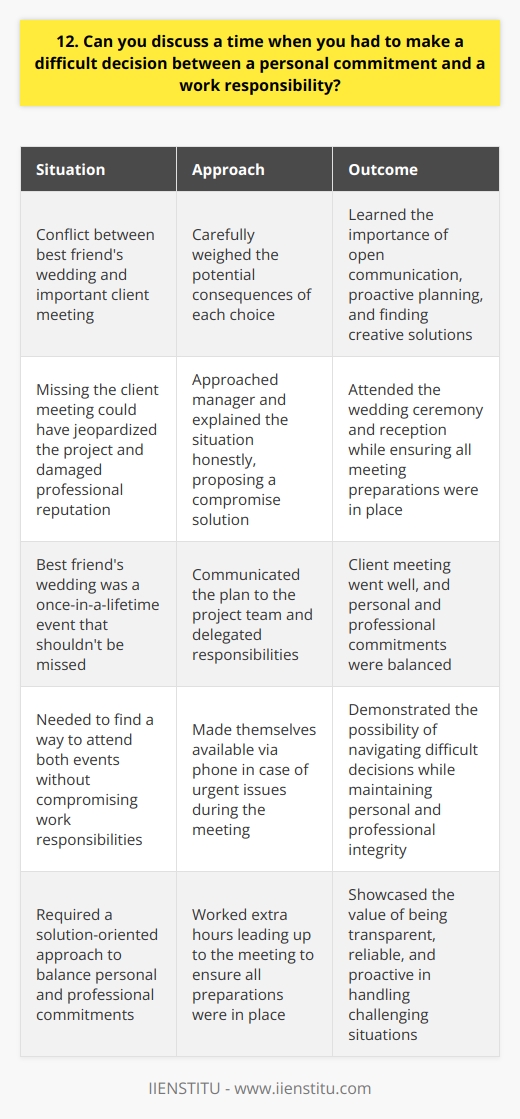
13. How do you ensure that you're fully present and engaged both at work and in your personal life?
Ensuring that I'm fully present and engaged both at work and in my personal life is something I've struggled with at times, but I've found a few strategies that help me strike a healthy balance.
Setting Boundaries and Priorities
I've learned to set clear boundaries between my work and personal time. When I'm at the office, I focus 100% on my job responsibilities and being productive. But once I leave for the day, I make an effort to unplug and devote my full attention to family, friends, and hobbies.
Prioritizing is also key. I regularly evaluate what's most important in both my professional and personal life, and make sure those things are getting the time and energy they deserve. It's easy to get caught up in busy work or distractions, so having my priorities straight helps me stay focused on what matters.
Mindfulness and Being in the Moment
Practicing mindfulness has made a big difference for me. When I find my mind wandering during a meeting or while playing with my kids, I gently bring my attention back to the present moment. Really tuning into what I'm doing, whether it's a work project or a conversation with a loved one, allows me to fully engage and give it my all.
Self-Care and Stress Management
I've realized that taking care of myself is essential for being present and at my best in all areas of life. Regular exercise, eating well, and getting enough sleep keep me energized and mentally sharp. When stress starts to build up, I take breaks to recharge, whether that's a quick walk outside or some deep breathing at my desk.
It's an ongoing process, but by setting boundaries, staying mindful, and practicing self-care, I'm able to show up fully both at work and in my personal life. The result is better performance on the job, stronger relationships, and a greater sense of fulfillment overall.
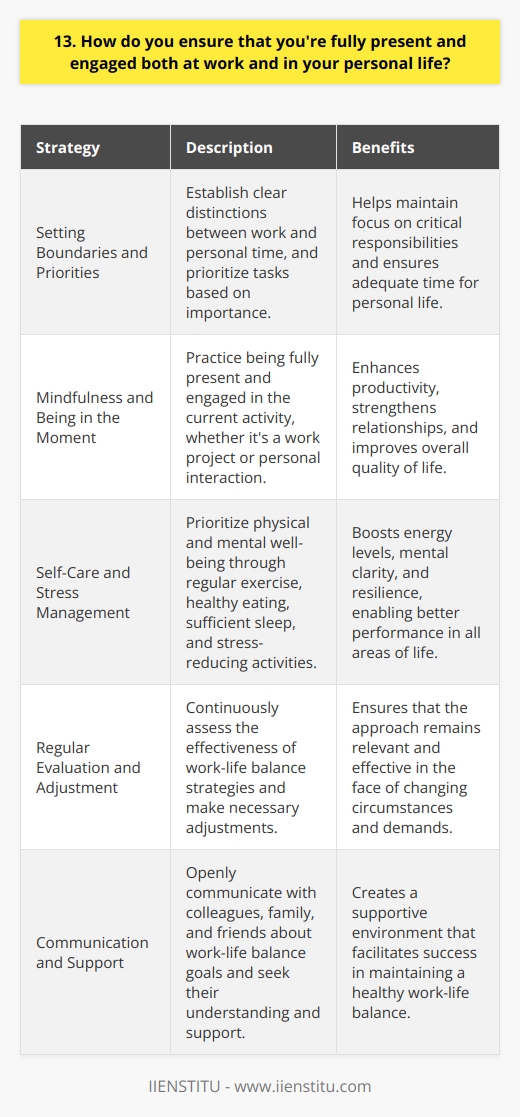
14. What do you do to disconnect from work and recharge during your time off?
During my time off, I make a conscious effort to disconnect from work and recharge my batteries. One of my favorite ways to do this is by spending time outdoors, whether it's going for a hike in the mountains or simply taking a leisurely walk in the park. There's something about being surrounded by nature that helps me clear my mind and let go of any work-related stress.
Pursuing Hobbies and Interests
I also find that pursuing my hobbies and interests outside of work is a great way to disconnect and recharge. For me, that means getting lost in a good book, trying out a new recipe in the kitchen, or working on a DIY project around the house. Engaging in activities that I'm passionate about helps me forget about work for a while and come back feeling refreshed and recharged.
Quality Time with Loved Ones
Another important aspect of my time off is spending quality time with my loved ones. Whether it's catching up with friends over dinner or going on a weekend getaway with my partner, connecting with the people who matter most to me helps me put things into perspective and remember what's truly important in life.
The Importance of Self-Care
At the end of the day, I believe that taking care of myself is key to being able to disconnect from work and recharge during my time off. That means getting enough sleep, eating well, and making time for activities that bring me joy and fulfillment. By prioritizing my own well-being, I'm able to come back to work feeling energized, focused, and ready to tackle whatever challenges come my way.
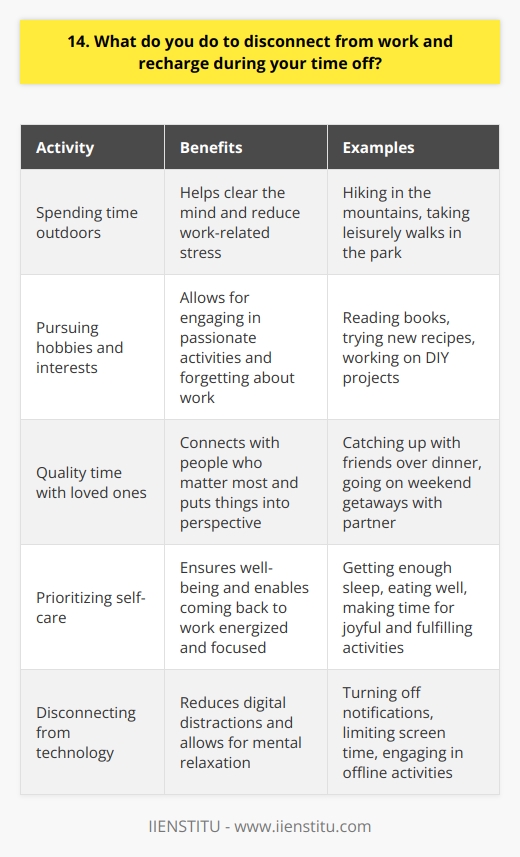
15. How do you prioritize self-care and mental health while managing a busy work schedule?
I believe that prioritizing self-care and mental health is crucial for maintaining a healthy work-life balance. Even with a busy schedule, I make sure to set aside time for activities that help me recharge and reduce stress.
Making Time for Exercise and Relaxation
I find that regular exercise, whether it's going for a jog or attending a yoga class, helps me clear my mind and boosts my energy levels. I also enjoy unwinding with hobbies like reading or playing music, which provide a much-needed break from work-related thoughts.
Prioritizing Sleep and Nutrition
Getting enough sleep is essential for my well-being, so I try to stick to a consistent sleep schedule. I also make an effort to eat nutritious meals and stay hydrated throughout the day, as this helps me feel my best both physically and mentally.
Setting Boundaries and Communicating Needs
When work demands are high, I've learned the importance of setting boundaries and communicating my needs to colleagues and supervisors. If I'm feeling overwhelmed, I don't hesitate to ask for help or discuss adjusting my workload to maintain a healthy balance.
By incorporating these practices into my routine, I'm able to effectively manage stress, stay focused, and bring my best self to both my personal and professional life. It's an ongoing process, but I've found that prioritizing self-care ultimately leads to improved performance and greater overall satisfaction.
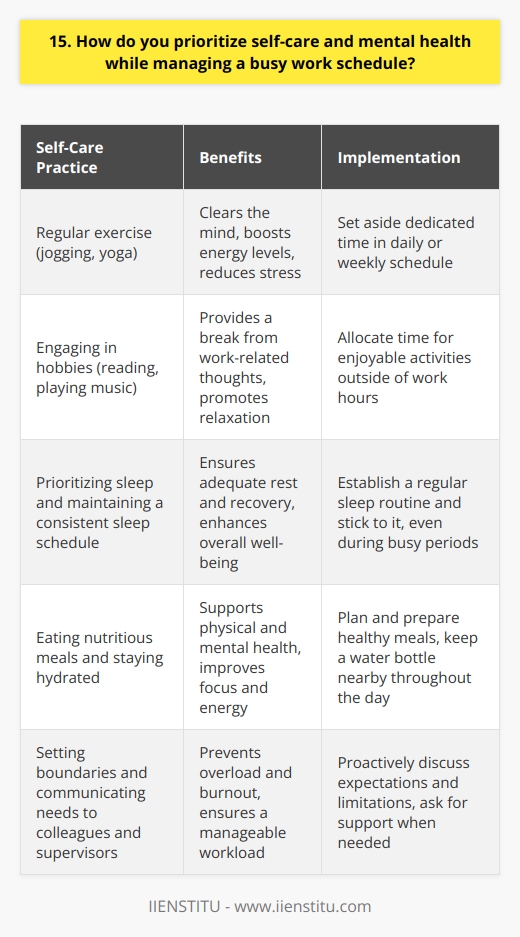
17. How do you handle the temptation to check work emails or take work calls during personal time?
I understand the importance of maintaining a healthy work-life balance and setting boundaries between personal and professional time. When I'm not at work, I make a conscious effort to unplug and focus on my personal life and relationships. This means silencing notifications on my work phone and resisting the urge to constantly check emails.
Strategies for Disconnecting
To help me disconnect, I engage in hobbies and activities that keep me present in the moment. Whether it's going for a hike, practicing yoga, or spending quality time with loved ones, I find that immersing myself in enjoyable pursuits makes it easier to resist work-related distractions.
Communicating Boundaries
I also believe in open communication with my colleagues and supervisors about my availability outside of work hours. I set clear expectations and let them know if there are specific times when I may be unreachable. Of course, in the case of true emergencies or critical deadlines, I remain flexible and willing to step up when needed.
Prioritizing Self-Care
Ultimately, I recognize that taking care of myself and recharging during personal time makes me a more focused and productive employee when I am at work. By being intentional about my time off, I can return to the office refreshed, energized, and ready to tackle new challenges.
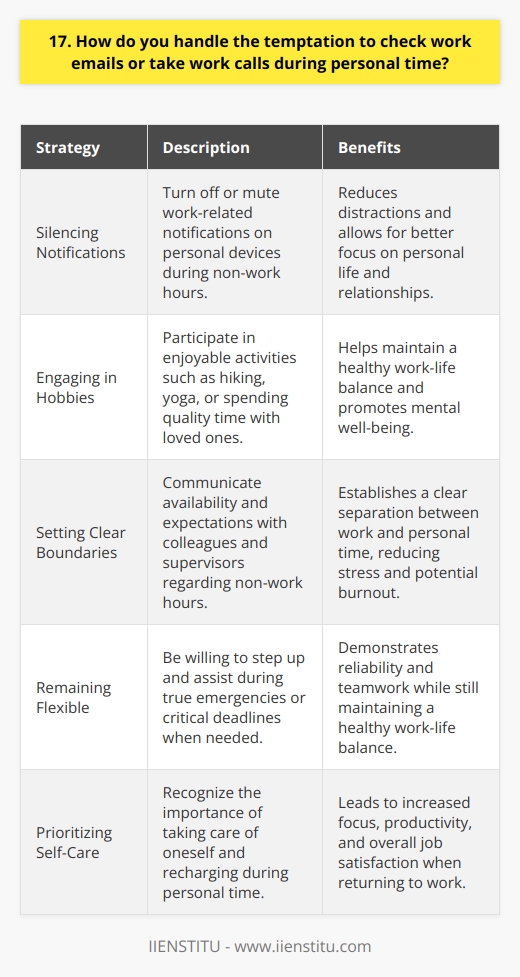
18. What strategies do you use to set boundaries between work and personal life?
I believe that maintaining a healthy work-life balance is essential for both personal well-being and professional success. One strategy I use is to set clear boundaries and communicate them to my colleagues and superiors. For example, I make it a point to leave the office at a reasonable hour each day and avoid checking work emails during evenings and weekends, barring any urgent situations.
Prioritizing Self-Care
Another important aspect of my approach is prioritizing self-care activities outside of work hours. I make sure to schedule time for hobbies, exercise, and spending quality time with family and friends. These activities help me recharge and come back to work feeling refreshed and focused.
Using Technology Mindfully
I also try to use technology mindfully to support my work-life balance. I silence notifications on my phone during personal time and use productivity apps to help me stay organized and efficient during work hours. This allows me to fully engage in both my professional and personal life without constant distractions.
Openly Communicating with Colleagues
Finally, I believe open communication with colleagues is key. If I have a personal commitment that requires me to adjust my work schedule, I make sure to communicate this clearly and work with my team to find a solution that meets everyone's needs. By being transparent and collaborative, I find that I'm able to maintain strong professional relationships while also prioritizing my personal life.
Overall, setting boundaries, prioritizing self-care, using technology mindfully, and communicating openly are the main strategies I employ to maintain a healthy work-life balance. I've found that by being proactive and intentional in my approach, I'm able to thrive both professionally and personally.
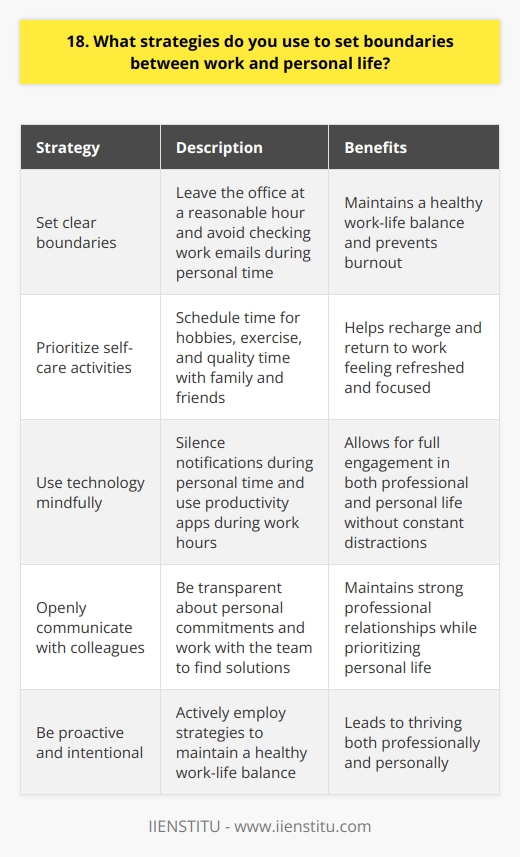
19. How do you communicate your availability to colleagues and clients while still maintaining personal time?
I believe in open and honest communication when it comes to my availability. I make sure to clearly communicate my working hours to both colleagues and clients from the outset. This helps set expectations and boundaries.
Proactive Communication
I'm proactive in letting my team know if I'll be away from my desk for an extended period. Whether it's a vacation, personal appointment, or just a long lunch, I give them a heads up. This way, they can plan accordingly and aren't left wondering where I am.
Respectful of Others' Time
Just as I value my personal time, I respect the time of my colleagues and clients. I try to schedule meetings and calls during mutually agreeable hours. If something urgent comes up outside of normal business hours, I ask if it's a good time before launching into the issue.
Flexibility When Needed
While I do my best to maintain a healthy work-life balance, I understand that sometimes extra hours are necessary. If there's a critical deadline or a client emergency, I'm willing to be flexible. However, I also make sure to communicate if I feel it's becoming a regular occurrence that's impacting my personal life.
Leading by Example
As a team member, I believe it's important to lead by example. By being transparent about my availability and respecting personal time, I hope to foster a culture of healthy boundaries. I've found that when everyone is open and honest about their capacity, we can work together more effectively and avoid burnout.
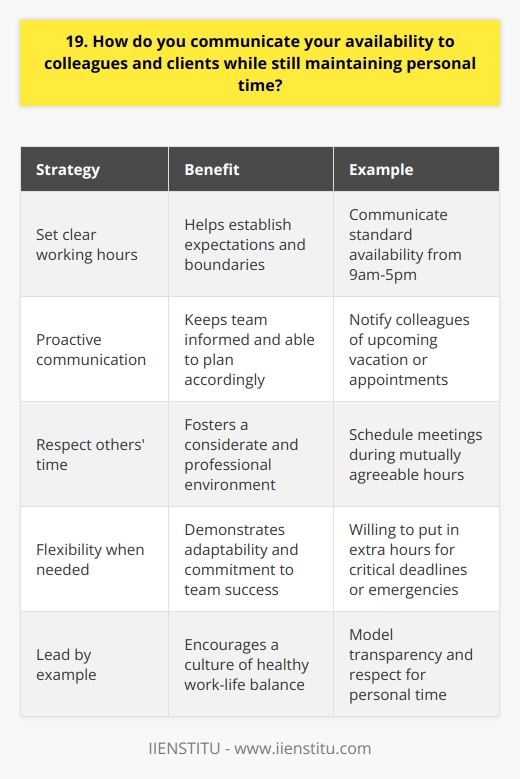
20. Can you describe a situation where you had to adjust your work schedule to accommodate a personal emergency?
In my previous job, I faced a situation where I had to adjust my work schedule due to a personal emergency. My elderly mother, who lives alone, had a sudden health issue and required immediate medical attention. As her primary caregiver, I knew I had to be there for her during this challenging time.
Communicating with My Manager
I promptly informed my manager about the situation, explaining the urgency and importance of being with my mother. I assured them that I would make up for the missed work hours and complete all my pending tasks. My manager was understanding and supportive, allowing me the flexibility to prioritize my family's well-being.
Adjusting My Work Schedule
To accommodate this personal emergency, I had to make some changes to my work schedule. I worked extra hours in the evenings and on weekends to ensure that all my deadlines were met. I also reached out to my colleagues, asking for their support and collaboration during this period.
Balancing Work and Personal Responsibilities
Balancing work and personal responsibilities was challenging, but I managed to do so with careful planning and time management. I created a schedule that allowed me to be there for my mother during her doctor's appointments and recovery while still fulfilling my professional obligations. It required sacrifices, like reducing my leisure time, but it was worth it to be there for my family.
Lessons Learned
This experience taught me the importance of open communication, adaptability, and the value of a supportive work environment. I learned that it's okay to ask for help and prioritize personal emergencies when needed. It also highlighted my ability to handle pressure, manage my time effectively, and maintain a strong work ethic even in the face of adversity.
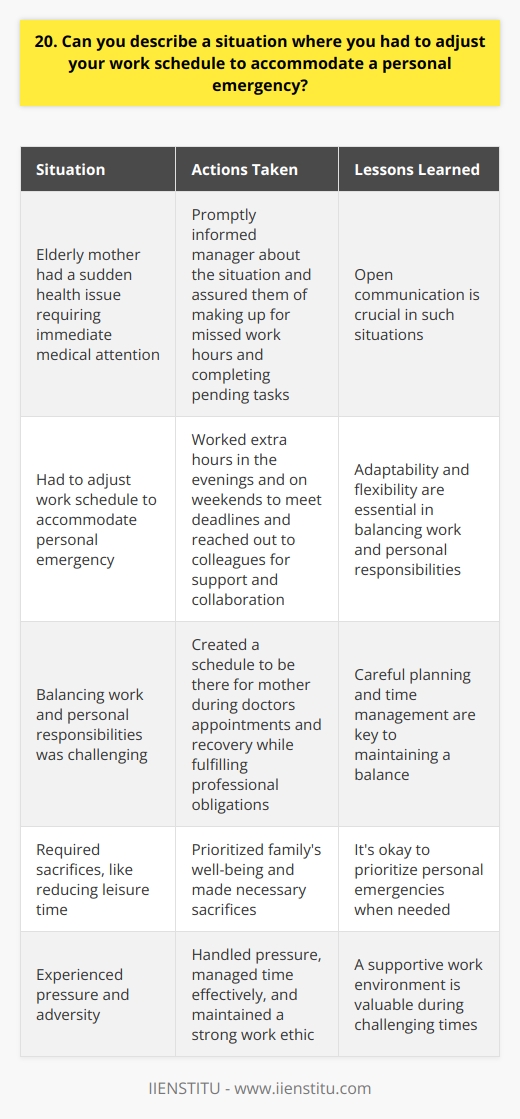
21. How do you ensure that you're meeting your professional goals while still making time for personal growth and development?
Balancing professional goals and personal growth is a challenge, but I've found effective strategies to manage both. I'm a firm believer in setting clear, achievable objectives at work and creating a roadmap to reach them. This helps me stay focused and motivated in my career.
Prioritizing Self-Care
At the same time, I recognize that personal development is equally important. I make it a priority to carve out time for self-care activities that rejuvenate me, like hiking on weekends or taking a painting class after work. These hobbies not only provide a creative outlet but also help me maintain a healthy work-life balance.
Continuous Learning
I'm also committed to continuous learning, both professionally and personally. I often attend industry conferences and workshops to stay up-to-date on the latest trends and best practices in my field. Additionally, I set aside time to read books and articles on topics that interest me, from psychology to world history.
Leveraging Workplace Resources
I've found that many companies offer resources to support employee growth and development. In my current role, I take advantage of the mentorship program and professional development courses offered by my employer. These opportunities have helped me expand my skill set and network with colleagues across departments.
Open Communication
Finally, I believe open communication with my manager is key to ensuring that I'm meeting my professional goals while also prioritizing personal growth. I schedule regular check-ins to discuss my progress, share any challenges I'm facing, and brainstorm solutions together. This ongoing dialogue helps me stay aligned with company objectives while also advocating for my own development needs.
In summary, by setting clear goals, prioritizing self-care, embracing continuous learning, leveraging workplace resources, and maintaining open communication, I've been able to successfully balance my professional ambitions with my personal growth and well-being.
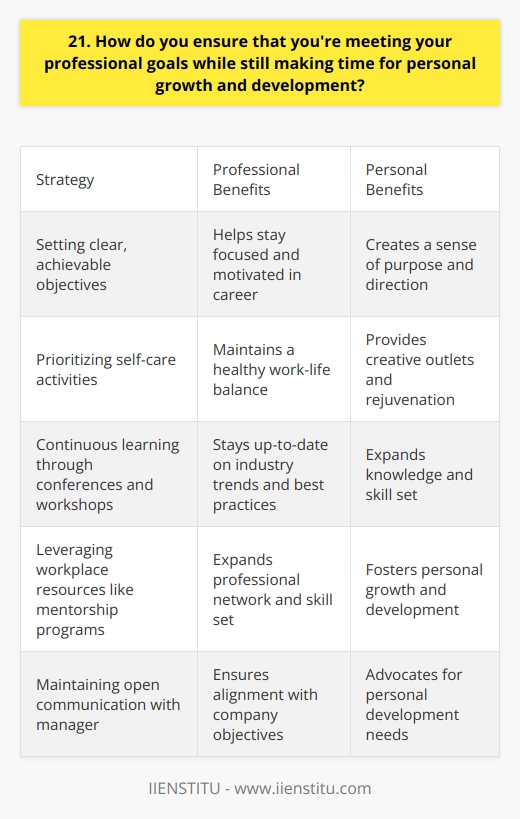
22. What role does delegation play in helping you balance work and personal responsibilities?
Delegation is a crucial skill that helps me balance my work and personal responsibilities effectively. By assigning tasks to team members based on their strengths and abilities, I can focus on high-priority items that require my direct attention. This not only allows me to manage my time more efficiently but also empowers my colleagues to take ownership of their work and develop their skills.
Trusting My Team
I've learned that trusting my team is essential for successful delegation. When I first started in a leadership role, I struggled with letting go of control. However, as I built relationships with my colleagues and recognized their capabilities, I became more comfortable assigning them important tasks. Now, I regularly check in with them to offer support and guidance, but I trust them to handle their responsibilities independently.
Communicating Clearly
Clear communication is key when delegating tasks. I make sure to provide detailed instructions, deadlines, and expectations upfront. This helps prevent misunderstandings and ensures that everyone is on the same page. I also encourage open dialogue and welcome questions or concerns from my team members. By fostering a collaborative environment, we can work together to overcome challenges and achieve our goals.
Balancing Work and Life
Effective delegation not only benefits my work performance but also allows me to maintain a healthy work-life balance. By sharing the workload with my team, I can leave the office on time and dedicate my evenings and weekends to personal pursuits. This past year, I was able to take a much-needed vacation with my family without worrying about work piling up in my absence. Knowing that I can rely on my colleagues gives me peace of mind and helps me recharge outside of work.
In summary, delegation is a vital tool in my toolkit for managing work and personal responsibilities. It enables me to prioritize tasks, develop my team's skills, and maintain a healthy balance between my professional and personal life.
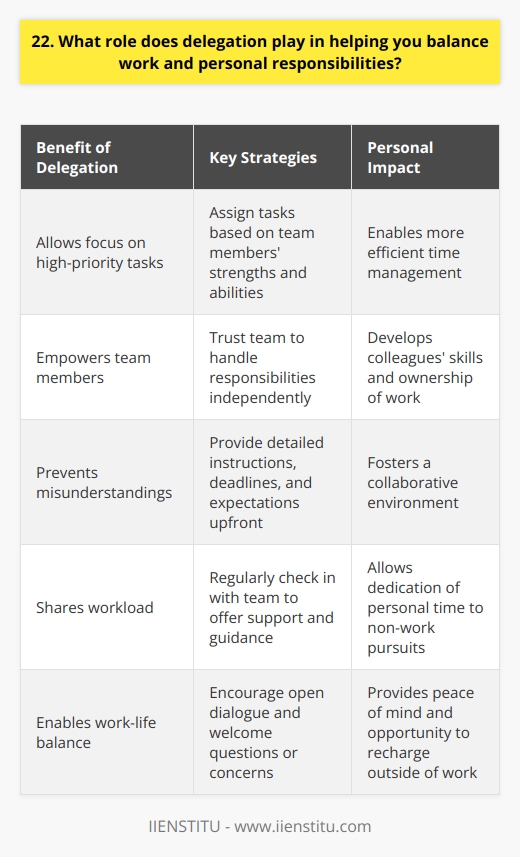
23. How do you prioritize your personal relationships and family time while managing a demanding career?
Prioritizing personal relationships and family time while managing a demanding career is all about balance and flexibility. I believe that open communication with loved ones is key to making it work. By clearly expressing my work commitments and responsibilities, I can manage expectations and avoid misunderstandings.
Scheduling Quality Time
One strategy I use is to schedule dedicated quality time with family and friends. I block off certain evenings or weekends in my calendar to ensure that I'm fully present and engaged during those precious moments together. It's not always easy, but I do my best to protect that time from work interruptions.
Flexibility and Adaptability
Of course, unexpected work emergencies or opportunities sometimes arise that require me to be flexible. In those cases, I try to communicate openly with my family about the situation. We work together to find alternative ways to connect, even if it means a quick FaceTime call or rescheduling our plans.
Leading by Example
As someone in a leadership role, I believe it's important to model healthy work-life balance for my team. By setting boundaries and prioritizing my own personal relationships, I hope to create a culture that values and respects everyone's life outside of work.
Maximizing Efficiency
Finally, I'm always looking for ways to maximize my efficiency at work so that I can be fully present at home. I ruthlessly prioritize tasks, delegate when appropriate, and strive to work smarter, not longer. It's an ongoing process, but I'm committed to finding that balance between a fulfilling career and cherished personal relationships.
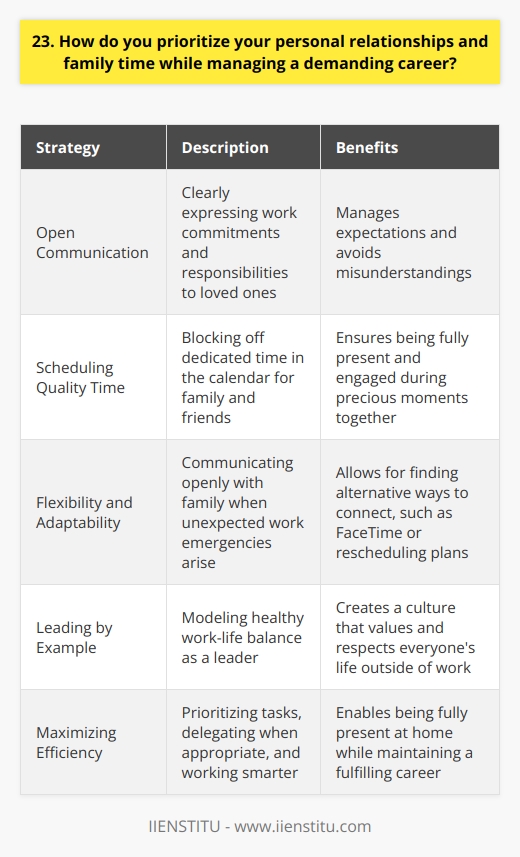
24. Can you discuss a time when you had to say no to a work request in order to maintain a healthy work-life balance?
In my previous role, I was working on a crucial project with a tight deadline. One evening, my manager asked me to stay late and complete an additional task. While I wanted to be a team player, I knew that taking on this extra work would compromise my ability to maintain a healthy work-life balance.
Assessing the Situation
I carefully considered the request and its potential impact on my well-being. I realized that consistently working late hours would lead to burnout and affect my overall productivity in the long run.
Communicating Clearly and Respectfully
I scheduled a meeting with my manager to discuss the situation. I expressed my commitment to the project's success but also highlighted the importance of maintaining a sustainable work schedule. I explained that taking on the additional task would require me to work unreasonable hours, which could negatively impact my performance and personal life.
Offering Alternative Solutions
Instead of simply saying no, I proposed alternative solutions. I suggested delegating the task to another team member with more availability or breaking it down into smaller, manageable parts that could be completed during regular work hours.
Finding a Compromise
My manager appreciated my honesty and proactive approach. We worked together to find a compromise that allowed me to contribute to the project while respecting my work-life boundaries. By having an open and constructive conversation, we found a solution that benefited both the team and my well-being.
This experience taught me the importance of setting boundaries and communicating them effectively. It strengthened my ability to prioritize my well-being while still being a valuable team member.
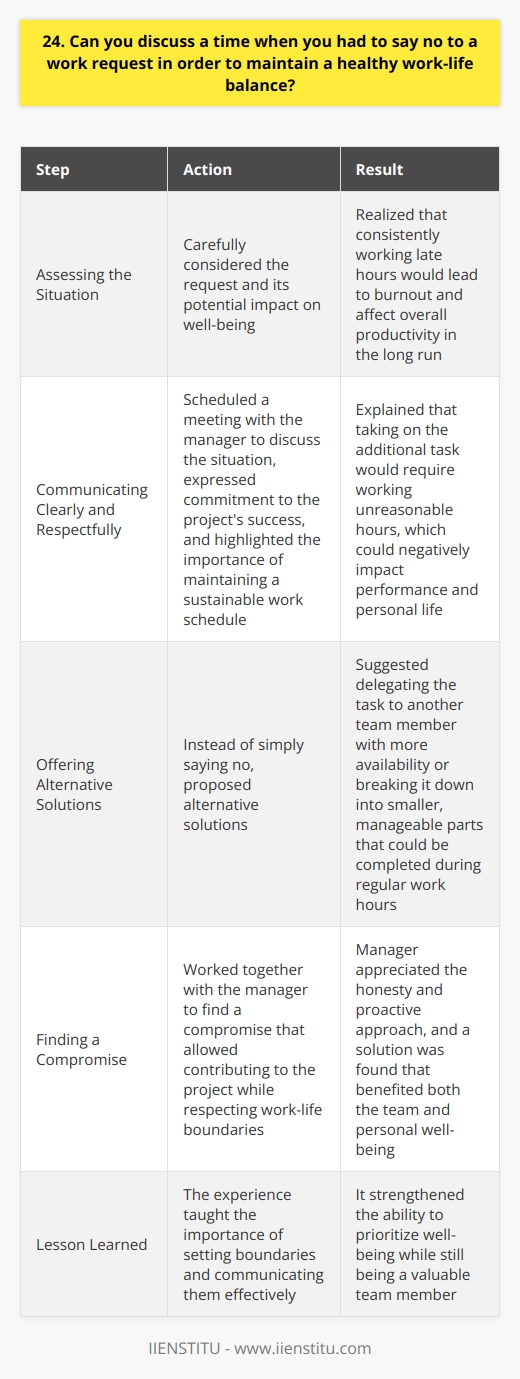
25. How do you handle the guilt or pressure that can come with taking time off work for personal reasons?
I believe taking time off for personal reasons is essential for maintaining a healthy work-life balance. When I need to take time away from work, I communicate openly with my manager and colleagues. I ensure my responsibilities are covered and that I'm available for any urgent matters.
Dealing with Guilt
It's natural to feel guilty about taking time off, but I remind myself that self-care is crucial. I know that by taking care of my personal needs, I'll be more focused and productive when I return. I engage in activities that help me recharge, like spending time with loved ones or pursuing hobbies.
Managing Pressure
If I'm feeling pressure about being away, I try to keep things in perspective. I remember that my company values its employees' well-being. Taking necessary time off is better for everyone in the long run. I also set clear boundaries and avoid constantly checking work emails or messages during my time away.
Returning to Work
When I come back from personal time off, I hit the ground running. I catch up with my team, prioritize tasks, and dive back into projects with renewed energy. By handling time off responsibly, I demonstrate my professionalism and dedication to both my personal life and career.
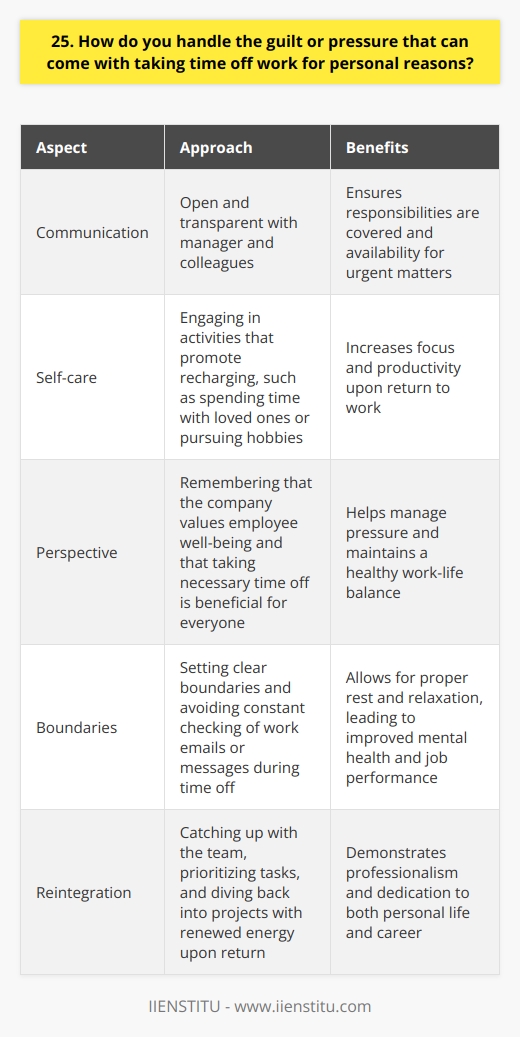
26. What strategies do you use to minimize distractions and stay focused during work hours?
To minimize distractions and stay focused during work hours, I employ several effective strategies that have proven successful for me. One key approach is to prioritize my tasks and create a clear plan of action for each day. By identifying the most critical assignments and allocating specific time blocks to work on them, I can maintain a sharp focus and avoid getting sidetracked by less important matters.
Eliminating Digital Distractions
Another crucial aspect of my strategy is to eliminate digital distractions. I silence my phone notifications and close unnecessary browser tabs or applications that might pull my attention away from the task at hand. I've found that by creating a clutter-free digital environment, I can immerse myself fully in my work and maintain a high level of concentration.
Taking Regular Breaks
While it may seem counterintuitive, taking regular breaks is an integral part of my focus-maintaining approach. I've learned that short, periodic breaks help me recharge, prevent mental fatigue, and ultimately enhance my overall productivity. During these breaks, I engage in brief stretching exercises or take a quick walk to refresh my mind and body.
Communicating with Colleagues
Effective communication with my colleagues is also essential for minimizing distractions. When I need uninterrupted focus time, I kindly inform my team members and ask them to reach out to me only for urgent matters. By setting clear boundaries and expectations, I can create a conducive environment for deep work and avoid unnecessary interruptions.
By implementing these strategies consistently, I've been able to significantly reduce distractions and maintain a high level of focus during my work hours. This approach has not only improved my productivity but has also contributed to the overall quality of my work and my ability to meet deadlines effectively.
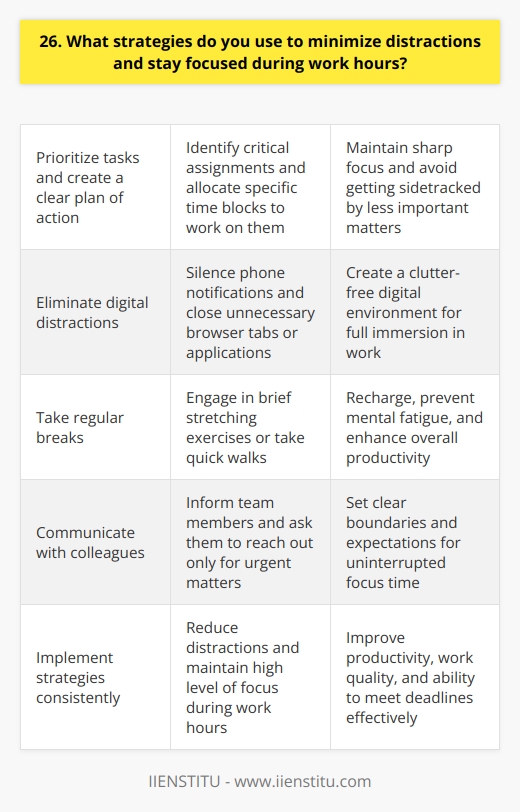
27. How do you ensure that you're taking care of your physical health while managing a busy work schedule?
Maintaining physical health while managing a busy work schedule is a top priority for me. I make a conscious effort to incorporate regular exercise into my daily routine, even if it's just a brief workout or a brisk walk during my lunch break. I find that this helps me stay energized and focused throughout the day.
Staying Hydrated and Nourished
In addition to exercise, I also prioritize healthy eating habits. I always make sure to pack nutritious snacks and meals to bring to work, so I'm not tempted to rely on vending machines or fast food options. Staying hydrated is also key, so I keep a reusable water bottle at my desk and make sure to refill it regularly.
Taking Breaks and Managing Stress
Another important aspect of maintaining physical health is managing stress levels. When work gets particularly hectic, I make sure to take short breaks to stretch, do some deep breathing exercises, or even just step outside for some fresh air. These small moments of relaxation help me recharge and tackle the rest of my tasks with a clear mind.
The Power of Sleep
Finally, I never underestimate the importance of getting enough sleep. No matter how busy my schedule gets, I always aim for at least 7-8 hours of sleep each night. I've found that when I'm well-rested, I'm more productive, creative, and better equipped to handle the demands of my job.
By prioritizing exercise, nutrition, stress management, and sleep, I'm able to maintain my physical health and bring my best self to work each day.
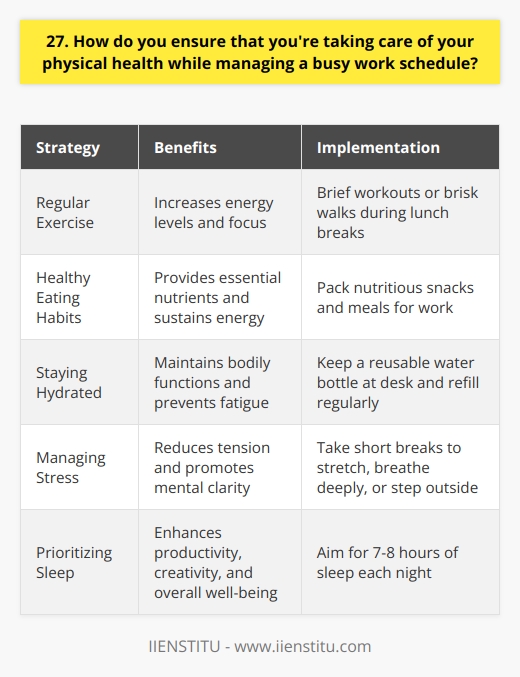
29. How do you handle the challenge of managing work and personal life when working remotely or from home?
Managing work and personal life while working remotely can be challenging, but it's not impossible. Over the years, I've developed some strategies that help me maintain a healthy work-life balance.
Setting Boundaries
One of the most important things I do is set clear boundaries between work and personal time. When I'm working, I focus solely on my job responsibilities and avoid distractions like household chores or personal errands. Similarly, when I'm off the clock, I make a conscious effort to disconnect from work and enjoy my free time.
Creating a Dedicated Workspace
I've found that having a dedicated workspace at home helps me stay focused and productive. It's a place where I can "go to work" each day, even if I'm not leaving the house. This physical separation between work and living spaces helps me mentally transition between the two.
Communicating with Family and Colleagues
Communication is key when working remotely. I make sure to keep my family informed about my work schedule and when I need uninterrupted time. Likewise, I stay in close contact with my colleagues through regular check-ins and updates. This helps everyone stay on the same page and minimizes misunderstandings.
Taking Breaks and Prioritizing Self-Care
It's easy to fall into the trap of working longer hours when you're at home. That's why I make a point to take regular breaks throughout the day to stretch, grab a snack, or just step away from my desk. I also prioritize self-care activities like exercise, hobbies, and socializing with friends and family. These help me recharge and avoid burnout.
Staying Flexible and Adaptable
Finally, I've learned that working remotely requires a certain level of flexibility and adaptability. Sometimes unexpected things come up, whether it's a family emergency or a last-minute work request. In these situations, I try to stay calm, communicate openly with my team, and find creative solutions that allow me to meet both my personal and professional obligations.
Overall, managing work and personal life while working remotely is an ongoing process. But with clear boundaries, effective communication, and a commitment to self-care, it's possible to thrive in both areas of life.
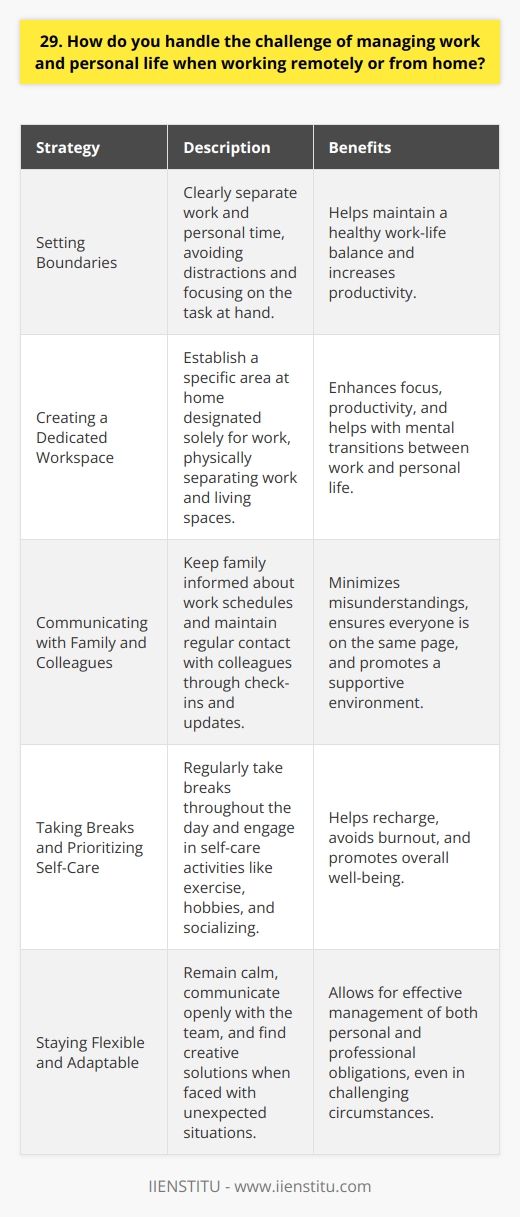
30. What advice would you give to someone struggling to find a healthy balance between their career and personal life?
Finding a healthy work-life balance can be challenging, but it's essential for long-term happiness and success. Here are some tips that have helped me maintain a good balance:
Set Boundaries and Stick to Them
Establish clear boundaries between work and personal time. When you're off the clock, focus on your personal life and resist the urge to check work emails or take calls. It's okay to disconnect and recharge.
Prioritize Self-Care
Make time for activities that promote your physical, mental, and emotional well-being. Whether it's exercise, meditation, hobbies, or spending time with loved ones, prioritize self-care to avoid burnout.
Communicate with Your Employer
If you're struggling with work-life balance, have an honest conversation with your manager. They may be able to offer flexible arrangements or support to help you achieve a better balance.
Learn to Say No
It's okay to say no to additional commitments or projects if they interfere with your work-life balance. Be selective about what you take on and prioritize your well-being.
Remember, finding a healthy work-life balance is an ongoing process. It requires effort, self-awareness, and a willingness to make adjustments as needed. By setting boundaries, prioritizing self-care, communicating with your employer, and learning to say no when necessary, you can create a more balanced and fulfilling life.
